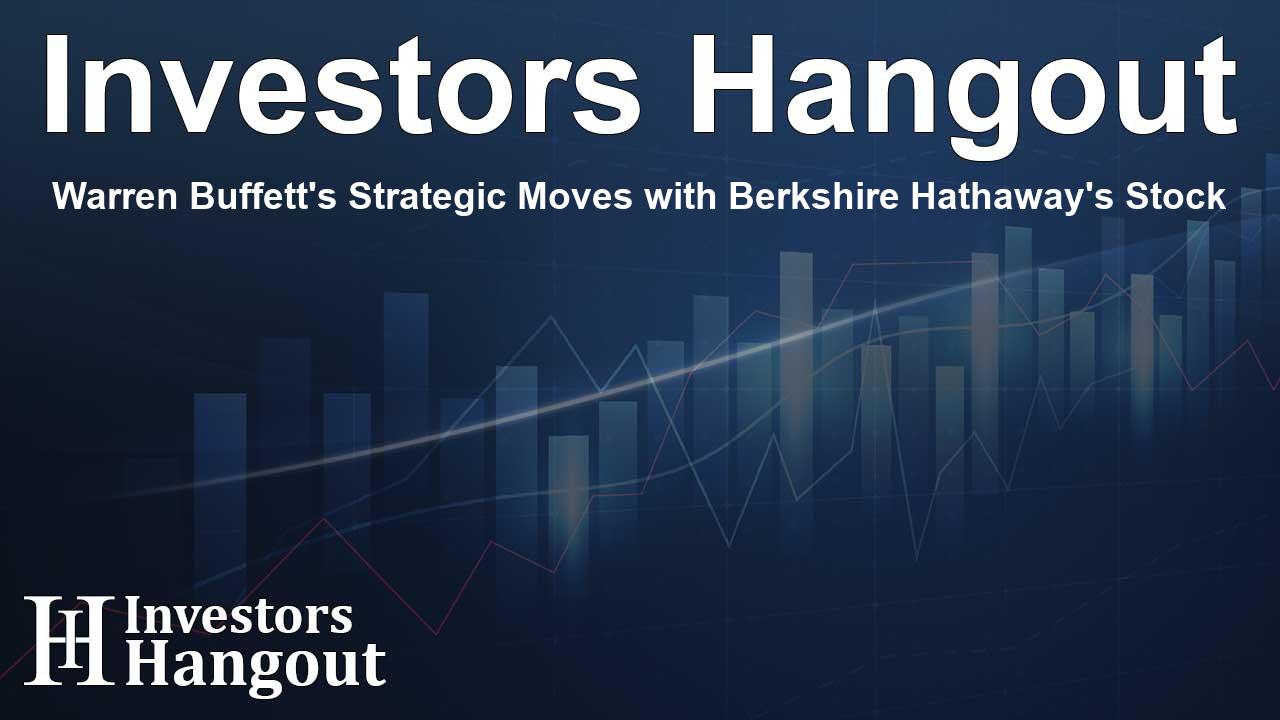Warren Buffett's Strategic Moves with Berkshire Hathaway's Stock

Warren Buffett’s Market Mastery and Stock Selection
For many decades, Warren Buffett, CEO of Berkshire Hathaway (NYSE: BRK.A, NYSE: BRK.B), has captivated both professional and casual investors with his remarkable ability to find value in the stock market. With little reliance on complex trading algorithms, the "Oracle of Omaha" has consistently outperformed market benchmarks, primarily the S&P 500.
Buffett's leadership has resulted in a staggering cumulative gain exceeding 5,500,000% for Berkshire Hathaway's Class A shares since he took the helm. The investment strategies appealing to Buffett's followers over the years have largely revolved around mimicking his buying and selling activities, often yielding significant returns.
Shifts in Investment Strategy
However, the last couple of years have seen a notable shift in Buffett’s strategy, marked by increased selling activity compared to buying. Despite the seemingly continuous selling, there's a high probability that Buffett has strategically invested in one time-tested stock during this recent quarter, especially given Berkshire's impressive treasure chest worth $277 billion.
Buffett has been known to remain steadfast even when faced with economic challenges. He emphasizes the importance of long-term investing, maintaining that while downturns and corrections occur, the length of economic growth phases typically far outweighs these downturns.
Net Selling Patterns
For the past several quarters, Berkshire has acted as a net seller rather than a buyer. The trend reflects a calculated approach, as evidenced by the sale of more than 500 million shares of Apple between October 2023 and June 2024, alongside a reduction of approximately 230 million shares of Bank of America (NYSE: BAC) stocks. As the third quarter nears its conclusion, shares sold of BofA continue to rise, highlighting Berkshire’s continued adjustment to its portfolio.
Buffett's valuation concerns appear to play a crucial role in these ongoing sales. He has hinted at potential corporate tax rate increases, suggesting that locking in profits from appreciated stocks like Apple now might serve as a prudent move for the long term.
Consistent Investment in Berkshire Hathaway
Amid all these shifts, Buffett remains committed to investing in a company that’s close to his heart: Berkshire Hathaway itself. Since July 2018, he has been buying back shares for 24 consecutive quarters, steadily increasing his ownership stake in the company. Repurchasing shares proves to be a straightforward way for Buffett to reward his investors, particularly promising future growth.
The recent changes in Berkshire's buyback rules have allowed Buffett to act more flexibly when evaluating stock repurchase opportunities. This shift reflects his philosophy of focusing on intrinsic value while maintaining adequate liquidity to capitalize on low-price opportunities.
The Impact of Buybacks on Shareholders
In the June-ended quarter alone, Berkshire Hathaway repurchased $345 million of its shares, adding to nearly $78 billion purchased since 2018. The ongoing buybacks not only enhance the value proposition for existing shareholders but also improve earnings per share (EPS), making the stock increasingly appealing to value investors. As the quarter progresses, it's likely that Buffett's buybacks will remain a centerpiece of his strategy.
Therefore, it stands to reason that as we approach the end of the latest quarter, Warren Buffett has maintained his track record of investing in his own company's stock, further reinforcing investor confidence.
Should You Invest in Berkshire Hathaway Today?
If you've been contemplating whether or not to invest in Berkshire Hathaway, consider this: The analyst team has recently identified various attractive investment opportunities, although Berkshire Hathaway wasn’t among the stocks highlighted.
Buffett’s enduring legacy of value investing combined with the current strategic shifts present a compelling narrative for potential investors. With seasoned insights and a wealth of experience, Buffett’s actions continue to shape the future of his company and provide direction for aspiring investors.
Frequently Asked Questions
What has been Warren Buffett's recent investment strategy?
Warren Buffett has shifted to more selling than buying in recent quarters, indicating a more selective investment approach while navigating economic challenges.
How has Berkshire Hathaway’s cash position changed?
Berkshire Hathaway's cash reserves have significantly increased, reaching an all-time high of $277 billion, attributed to a long-term focus and strategic stock sales.
What stock has Buffett consistently purchased?
Buffett has been steadily purchasing Berkshire Hathaway shares for 24 consecutive quarters, adding value to shareholders through buybacks.
What factors influence Buffett’s stock selling?
Buffett's selling decisions are influenced by factors like stock valuations, potential tax rate changes, and market conditions, reflecting his cautious approach.
Why are buybacks important for shareholders?
Buybacks enhance shareholder value by increasing ownership stakes, improving earnings per share (EPS), and demonstrating confidence in the company's future.
About Investors Hangout
Investors Hangout is a leading online stock forum for financial discussion and learning, offering a wide range of free tools and resources. It draws in traders of all levels, who exchange market knowledge, investigate trading tactics, and keep an eye on industry developments in real time. Featuring financial articles, stock message boards, quotes, charts, company profiles, and live news updates. Through cooperative learning and a wealth of informational resources, it helps users from novices creating their first portfolios to experts honing their techniques. Join Investors Hangout today: https://investorshangout.com/
Disclaimer: The content of this article is solely for general informational purposes only; it does not represent legal, financial, or investment advice. Investors Hangout does not offer financial advice; the author is not a licensed financial advisor. Consult a qualified advisor before making any financial or investment decisions based on this article. The author's interpretation of publicly available data shapes the opinions presented here; as a result, they should not be taken as advice to purchase, sell, or hold any securities mentioned or any other investments. The author does not guarantee the accuracy, completeness, or timeliness of any material, providing it "as is." Information and market conditions may change; past performance is not indicative of future outcomes. If any of the material offered here is inaccurate, please contact us for corrections.